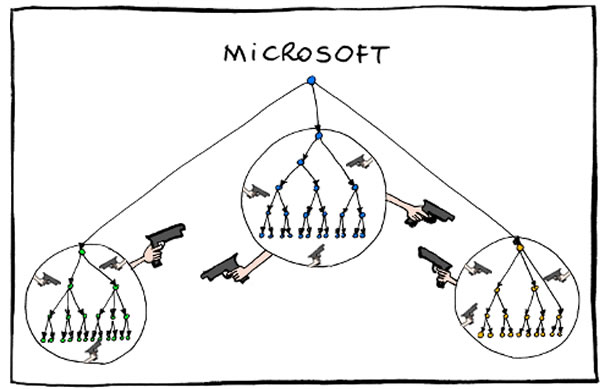Sure, any platform over time will begin to fragment, but Microsoft seems hell bent on ensuring minimal portability of source code across their recent platforms. Whereas 1992 source code written for Win32 can be recompiled and run without modification throughout the intervening years, the same cannot be said of code written for Silverlight, WPF, WP7 and now Win8 and WP8.
The half life of supported development platforms has fallen precipitously. Silverlight, dead. WPF ailing, WP7 obsolete, and the newcomers Win8 and WP8 proclaiming themselves the new shining path going forward.
But developers are now gunshy and looking elsewhere, having learned through painful experience that Microsoft seems unable to commit to a coherent, long term development strategy. Presumably this is an outcome of the org chart from the last decade:
One would have hoped that C# and the painfully verbose XAML would form the foundation of the future, but then COM and C++ were confusingly resurrected, and we’re all invited to enjoy sprinkle our code with pointy hats:
task<IVectorView<StorageFile^>^>(picker->PickMultipleFilesAsync())
.then([this, uri] (IVectorView<StorageFile^>^ files)
Or we can learn the joys of non-typesafe code by switching to javascript and CSS for coding our Win8 UI (but not WP8!).
Since C#, javascript, and C++ and associated controls and libraries aren’t compatible for developing applications across Win8 and WP8, the future for Windows developers will be one of continued pain.

No comments:
Post a Comment